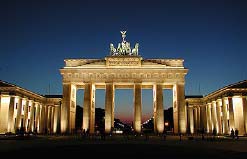| German I, Semester I; Das Wetter |
|
| Sections: |
Introduction | Section 1 | Section 2 | Section 3 | Dictionaries |
| Section One: |
| Section One - Part A
The Spreewald region southeast of Berlin is one of the most beautiful and unique nature preserves in Europe. The tributaries of the Spree (“shpray”) River and surrounding forest (Wald) create an inland delta with a network of over 50 miles of branching water paths. For people who live in the Spreewald interior, shopping, commuting to work and transporting larger objects is traditionally done by boat. The most famous product of the region is the Spreewald pickle. In 1991, the Spreewald was declared a UNESCO Biosphere Preserve.
Das Lesestück (Reading Passage) Ich heisse Sabine Schiffer. Ich wohne in Berlin, Deutschland. Ich lerne Deutsch und Englisch. Ich schwimme gern. Ich spiele Rockmusik und Rapmusik. Wie ist das Wetter in Berlin? Das Wetter ist schlecht in Berlin. Es ist kalt im Winter, und es regnet. Es schneit im Dezember, Januar und Februar. Es ist es mild und kühl im Frühling. Wie ist die Tempertur im Sommer? Die Temperatur ist 27 Grad im Sommer. Es ist sehr heiss!
Wie ist die Temperatur in
Berlin im Sommer?  Berlin Berlin has a very interesting history as you will learn in this chapter. After World War II, the victorious Allies divided Germany into two sections, East and West Germany. East Germany , occupied by the Soviet Union, had a socialist government, while West Germany , occupied by the U.S., France and Britain, had a social-democratic government (which is very similar to ours in the U.S.). After 40 years of being divided into two separate countries, Germany was reunited on October 3, 1990 (Tag der Deutschen Einheit), and has had to deal with many economic hardships, namely converting the old Ostmark to the West's Deutsche Mark. Now, all of Germany uses the Euro since they are members of the European Union (EU). Some peculiar things you might notice while you are in Berlin might be that some people living in the former East-bloc portion of the city have unusual apartments. Some of the apartments may or may not have a private bathroom. For example, if you have a "shared" or "common" bathroom, you would have to go outside of your apartment and into the hallway to reach the WC (a borrowed abbreviation for Water Closet) which only has a toilet and a maybe a small hand sink. Believe it or not, there used to be shared WCs in the United States up until about the 1960s in the older apartment buildings on the east coast. You also should know that in Germany, you need to ask Wo ist die Toilette? or 'where is the toilet' if you need to use one, because if you asked a German 'where is the bathroom', they would think that you wanted to take a shower. Some other interesting things you might notice are that there are unusually large apartment buildings that are so large that they seem surreal. These large apartment buildings and apartment groups of buildings can seem to tower overhead like a skyscraper you would see in a downtown area of a large American city. The reason they were built that way was because the former East German government wanted to eradicate homelessness, thus they built and supplied every citizen with a place to live. Today, however, you would notice that most of the middle- and upper class citizens have moved on to better and more modern housing, leaving these large apartment blocks to the poor and immigrant communities. You will also see in Berlin a wide variety of architectural styles. Some of the buildings are very old, but some of them were re-built after WWII in the same style as the original building. Much of Berlin was destroyed during WWII, especially the Potsdamer Platz area. You might also see "ein Trabi", or a Trabant, which was a type of car built by the East Germans. Trabis aren't very common today, as they weren't exactly reliable, but some have 'retro' value.
|
|
© 2005 Aventa Learning. All rights reserved. |